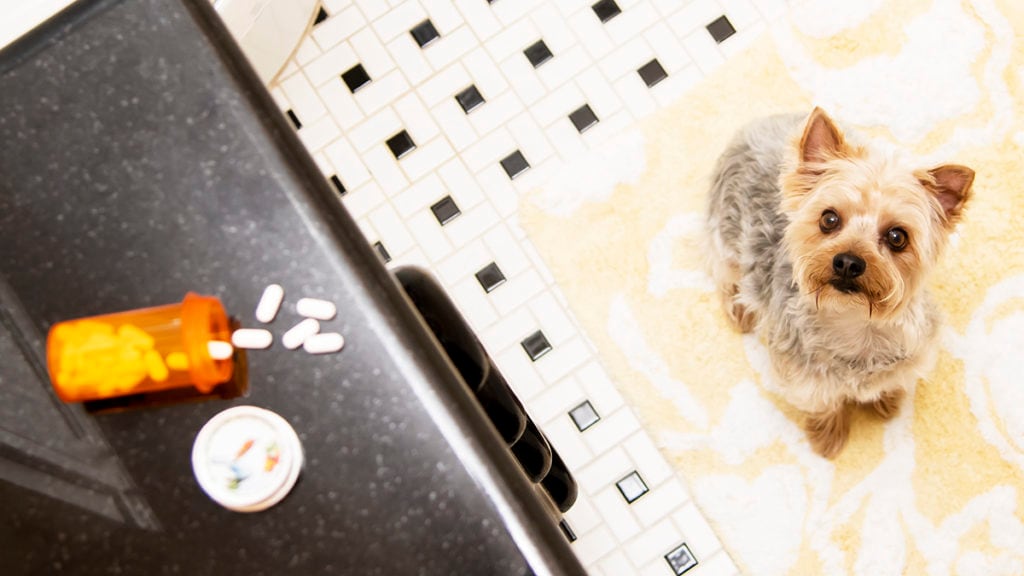Did you know many things that are harmless to humans can be toxic to dogs and cats? There probably are items in your home right now that you need to safeguard your pets against.
Below are 10 of the most common households items that are toxic to dogs and cats, and advice on what to do if you think your pet has ingested them. In all cases, if you suspect your pet has been exposed, immediately contact a veterinarian for advice.
1. Chocolate
This household sweet continues to dominate the poison lists from the American Society for the Prevention of Cruelty to Animals Animal Poison Control Center (APCC), and it primarily affects dogs who are attracted to the taste. Chocolate also is toxic to cats, but chocolate toxicity in cats is much less common because cats aren’t as attracted to chocolate as dogs are.
Chocolate toxicity can cause vomiting, diarrhea, increased thirst and urination, panting or restlessness, seizures and heart problems. PetMD has a chocolate toxicity calculator that can give you an idea if the amount your dog consumed is toxic or not. For safety, contact your vet about the chocolate ingestion.
Treatment for chocolate toxicity depends when the pet ate the chocolate. If it just happened, then veterinary treatment consists of inducing vomiting, administering activated charcoal and providing supportive care. If the pet ate chocolate hours ago, then treatment might require hospitalization and supportive care.
2. Rat Poison
Accidental ingestion of rat poison is very common in dogs, but again, much less common in cats. In both species, however, rat poison can cause excessive bleeding due to interference with blood clotting, or seizures and asphyxiation due to nervous system dysfunction.
Veterinary treatments can include inducing vomiting, and might require supportive care, blood transfusions and/or prescription-strength vitamin K supplementation.
3. Xylitol
Xylitol is a common sugar substitute found in many foods. Xylitol is extremely toxic to dogs, but in cats, xylitol toxicity remains unknown. Because of this, cat parents should be vigilant if they think their kitty might have ingested xylitol.
Xylitol can cause low blood sugar, seizures, liver failure or death. If you suspect your pet has ingested xylitol, call your veterinarian immediately.
4. Marijuana
Now that marijuana is legal in many states, it is becoming more common to see marijuana toxicity in pets. Usually, pets access brownies, edibles or pot butter, but they also can develop toxicity from secondhand pot smoke.
Signs of toxicity can range from glassy eyes, excessive vocalization, uncontrolled urination, seizures or coma. Depending on the amount ingested, the signs and when the marijuana was ingested, veterinary treatment can include inducing vomiting, administrating activated charcoal and hospitalization.
5. Anti-Inflammatory Medication
Anti-inflammatory medication, such as carprofen, often comes in tasty chew form because dogs love to eat the chews. The problem occurs when the dogs love the chews too much and eat a whole bottle.
Signs of anti-inflammatory intoxication range from vomiting, diarrhea and abdominal pain to seizures or tarry stools. Veterinary treatment can consist of inducing vomiting, administering stomach protectants or activated charcoal, and supportive care.
Note: Cats are not typically given carprofen as an anti-inflammatory medication. A large dosage of carprofen can be very toxic to cats and should be avoided at all costs.
6. Plants
Most varieties of lilies are toxic to dogs and cats. These include peace lilies, amaryllis lilies and palm lilies. Symptoms of lily toxicity in pets include tremors and gastrointestinal upset.
Other common household plants, such as oleander and sago palm, are very toxic to cats and dogs. They can cause heart failure and liver failure in both dogs and cats.
It is best to not keep these plants in your home or yard if you have pets. For other plant concerns, the ASPCA Animal Poison Control Center has a great toxic and non-toxic plants list to use as a resource. If you suspect your pet has chewed or ingested one of your houseplants, call your veterinarian immediately. Treatment will be dependent on the type of plant eaten and is best determined by your vet.
Read our guide to poisonous plants for dogs.
Read our guide to poisonous plants for cats.
7. Antifreeze
Some antifreeze products that are used in vehicles contain a toxic compound, ethylene glycol, that can cause kidney failure and death if ingested. It only takes a tiny amount!
If you suspect your dog or cat has ingested antifreeze, take your pet to an emergency room immediately. Veterinary treatment includes an antidote within the first couple of hours.
8. Antidepressants
Accidental ingestion of antidepressants continues to be a big concern with dog and cat parents, so keep those medications locked up and out of reach of pets! Effexor and Cymbalta seem to have a particular draw to cats, and all antidepressants can cause heart or neurological problems.
Treatment depends on the amount ingested, the timing of ingestion and the size and symptoms of the pet.
9. Grapes and Raisins
Dogs love sweets, and grapes and raisins are sweet and deadly to dogs. A pup that consumes grapes or raisins can develop kidney failure severe enough to lead to death.
For cats, grapes and raisins are also toxic, but in the event that you find your kitty has eaten any, contact your vet.
Treatment again depends on the size of the pet and how much was ingested.
10. Household Cleaners
Most household cleaners, such as Febreze, carpet shampoos and toilet cleaning tablets, are fairly safe, but some cleaners can be concentrated enough to cause problems. Usually the taste is enough to deter most pets from consuming household cleaners.
In mild cases of ingestion, drooling or stomach upset might occur. Laundry pods, on the other hand, can be deadly to pets. If a pet has bitten into a laundry pod or licked laundry pod detergent off of fur or the floor, signs can range from vomiting and coughing to difficulty breathing or wheezing.
If your pet has been exposed to a laundry pod, it is important to flush the mouth, fur and/or eyes with copious amounts of water until the slick, soapy feeling is flushed away. Then call your veterinarian immediately.
If your pet has been exposed to any of the toxins in this list, it is imperative to get professional help as soon as possible. Call your local veterinarian, the local emergency clinic and/or the Pet Poison Helpline at 1-855-764-7661.
Share:









